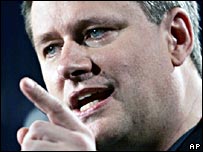Don Martin in the National Post sums up the latest Harper shoot from the lip international blunder. It seems every time Harper gets on a plane he suffers from Air Rage. He did it this summer over the war in Lebanon and now he does it to China. Truly he is no Statesman. And he doesn't appear to want to be.
After the Chinese leadership asked Harper for a meeting to ease rising tensions between the two countries, the Prime Minister insisted human rights would be on the formal agenda and no mere superpower could decree otherwise.No one in the PMO can explain why Harper waited for the Chinese to extend the invite, what made Harper think he could dictate the agenda and why this rookie Prime Minister failed to grasp the protocol for dealing delicately with concerns that rankle notoriously prickly Chinese leaders.
Business leaders don't like what they're hearing because warm government relations are essential to smooth Chinese trade relations. Experts say it was a mistake because Harper denied the Chinese a face-saving escape. Even friendly government forces in Alberta think Harper's heavy-handed tactics are off base.
Some observers see Calgary MP Jason Kenney, the Prime Minister's sidekick and notorious mainland nose-thumber, as the China clipper.
He defiantly met the Dalai Lama, a Tibetan holy man viewed as a separatist agitator by the Chinese, and was the cheerleader for giving him an honorary Canadian citizenship.
But it's more than just Kenney freelancing on the file. Stockwell Day wrote a paper in favour of recognizing Taiwan while he was Conservative foreign affairs critic. Foreign Affairs Minister Peter MacKay, after attacking China for industrial espionage, turned his political back on meeting the Chinese ambassador for too long. And if that wasn't enough evidence of chilling China relations, a Chinese human rights discussion process and a strategic partnership group set up by the Liberals are being mothballed.
Besides, if Harper insists on riding the high white horse to defend human rights, he'd better watch where he gallops. Violations are not exclusively a made-in-China concept.
Russia has been caught allegedly spying in Canada and been red-flagged by Amnesty International for deteriorating human rights protection. Funny how Harper went to Moscow in July and neglected to raise either concern with President Vladmir Putin.
And what about Dubya? The United States has been fingered for holding "thousands" of prisoners without charge or trial in Iraq, Afghanistan and the Guantanamo Bay naval base in Cuba. Will Harper scold George Bush? Doubt it.
See:
Harper
Lebanon
China
Find blog posts, photos, events and more off-site about:
China, cults, sects, religion, gays, Chinese, Falun Gong, San Fransisco, Rob Anders, Conservatives, MP, Canada,
Stephen Harper, Stockwell Day, Jason Kenney, government, trade, Prime Minister, APEC, CIA, racist, homophobia, Epoch Times, Falon Dafa, Viet-nam, APEC, Conservatives, Conservative, Government, human-rights, free-press, PM, PMO,








